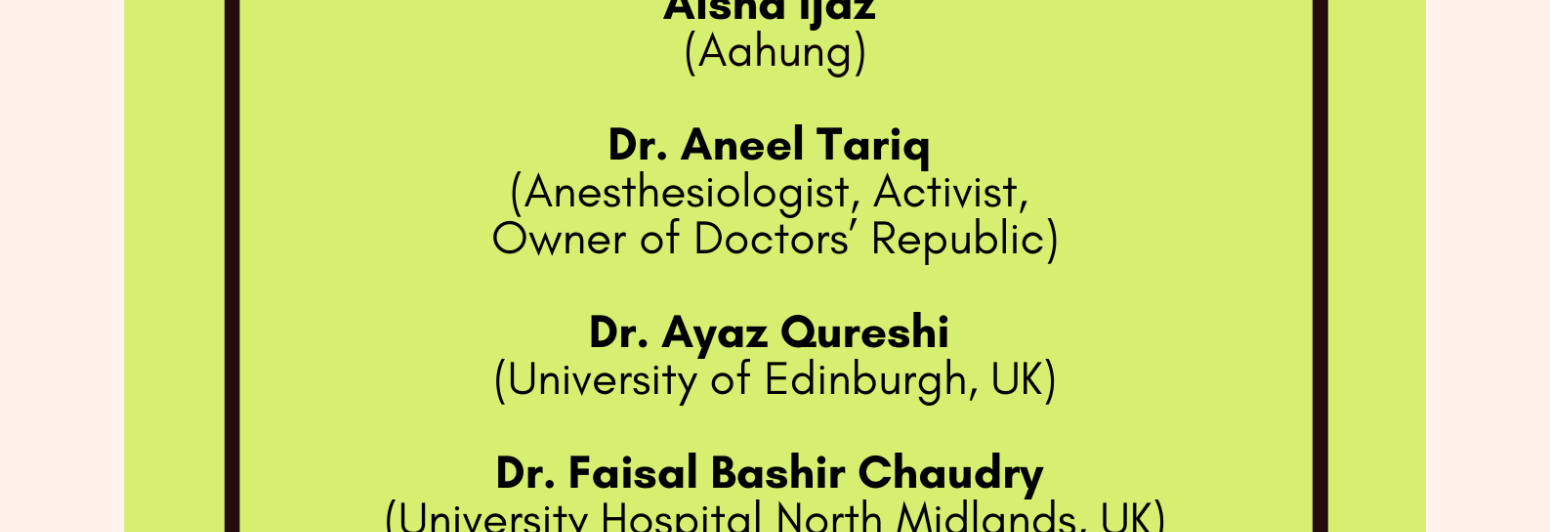
March 2, 2021
The COVID-19 pandemic has exposed the fragility and precarity of health systems across the world. Decades of privatisation, divestment and underfunding in the health sector by the state has left the health system often stretched beyond its capacity and barely able to care for those who needed it the most. The pandemic in more than one way has made us confront this on-going collapse. And yet, perhaps this very breakdown is the cause for new hope. The COVID-19 pandemic has allowed us to appreciate the real limits and fragility of all the social, technological, and material worlds we inhabit, and to recognise that the old orders may well and truly be in the process of coming apart.
In this panel, we focus on the vulnerabilities inherent within Pakistan’s health system and take the opportunity to engage in a generative and productive process: an occasion to imagine and create new orders and new systems premised on equity and sustainability. Therefore, we want to focus on how people, alone or together, overcome the hurdles created by the pandemic, build new solutions or tinker with the old ones to make them work. Our aim then is to consider the steps towards rethinking the way Pakistan, and the world, approaches care.
Moderated by Dr. Ayesha Masood, Assistant Professor at LUMS, the webcast will be live streamed on the Facebook page. You can ask your questions in the comment section of the live stream.
Date: Tuesday, March 2, 2021
Time: 5:00 pm (PKT)
Join us for an informative discussion!
Profiles of Panelists:
Aisha Ijaz
Ms. Ijaz has been working at Aahung since 2008, and is currently the Programme Director responsible for overseeing the entire team in the development and management of all programmes and projects. She has has over 12 years of experience in NGO programming on intimate partner violence in the USA, and Sexual and Reproductive Health and Rights (SRHR) in Pakistan.
Dr. Aneel Tariq
Dr. Tariq is a Consultant Anesthesiologist based in Faisalabad. He is also the Founder of two initiatives, Doctors’ Republic and Young Doctors Association Periphery (YDAP).
Dr. Ayaz Qureshi
Author of eminent book, AIDS in Pakistan: Bureaucracy, Public Goods and NGOs, Dr. Qureshi is currently a professor of Medical Anthropology at the University of Edinburgh, UK. His research interests include infectious disease, sexual and reproductive health, NGOs, healthcare systems, labour relations, and health and migration.
Dr. Faisal Chaudhry
Dr. Chaudhry graduated from King Edward Medical College in 2005, and is trained in General and Stroke Medicine from Mayo Hospital, Lahore, Pakistan and Oxford University Hospitals, UK. He is currently working as a Consultant in Stroke Medicine at the Shrewsbury and Telford Hospital NHS Trust. Dr. Chaudhry is also a member of the Royal College of Physicians, London, International Society of Global Health, Edinburgh, British Association of Stroke Physicians and Society of Acute Medicine, UK.
Dr. Sara Saeed Khurram
Distinguished TedX speaker and Rolex Award Associate Laureate, Dr. Khurram is the CEO and Cofounder of Sehat Kahani, an all-female health provider network that uses telemedicine to provide quality healthcare to those in need. She is also a Rainer Arnhold Fellow 2020, Acumen Fellow and a Cartier Fellow.
Dr. Ayesha Masood
Dr. Masood is an Assistant Professor of Organisational Behavior at LUMS. She holds a PhD in Anthropology from Arizona State University, USA, an MA in Political Science from the University of the Punjab, and an MBBS degree from King Edward Medical College. Dr. Masood's research is broadly situated in feminist and critical methodologies, and focuses on issues related to gender in organisations, evidence-based health policy, managing human resources in health and policy implementation.



















